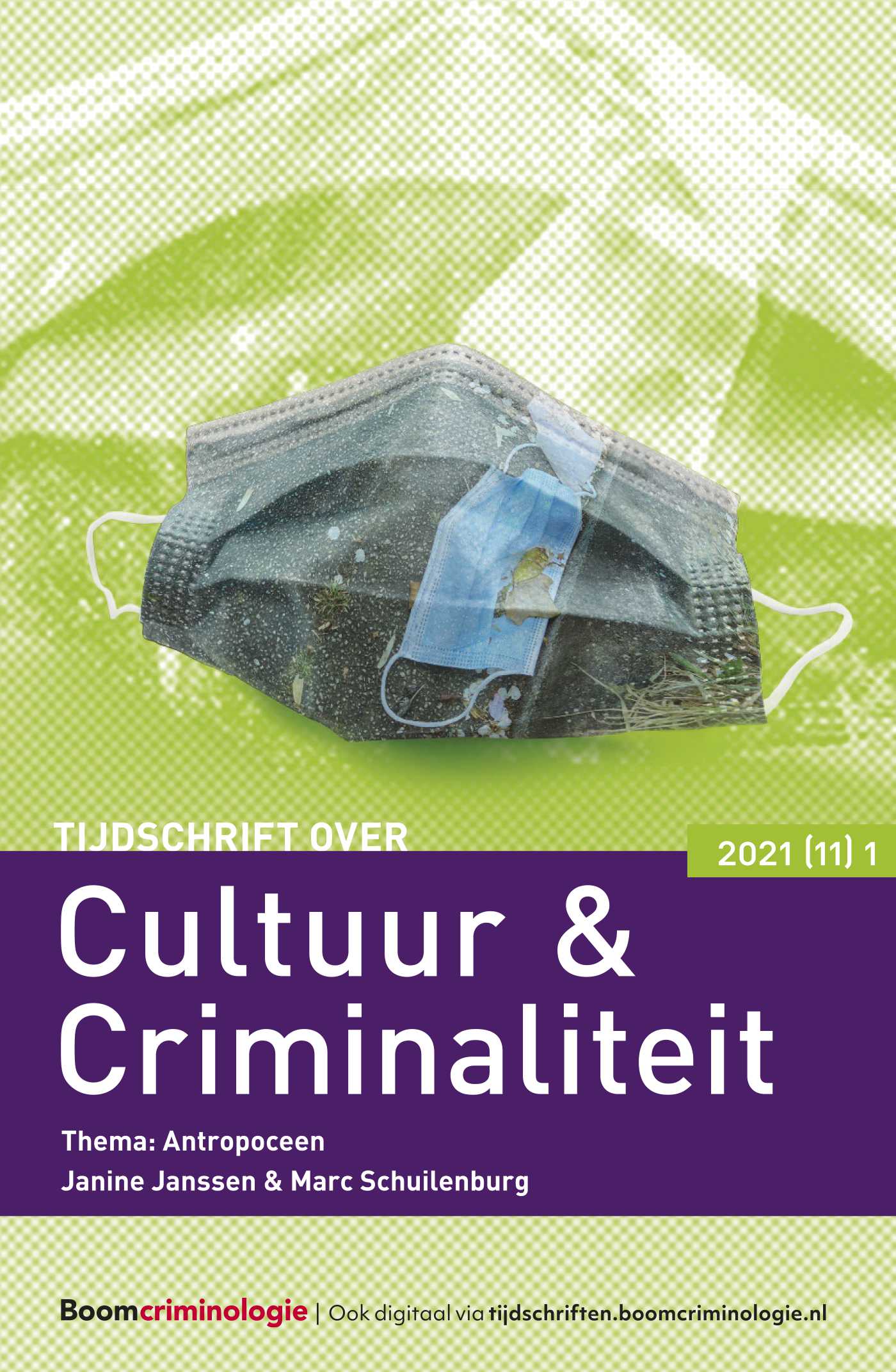|
This introduction offers an overview of current academic discussions about the term ‘conspiracy theory’, the historical development of conspiracy beliefs, and academic knowledge of the phenomenon. In addition, it addresses the relation between conspiracy thinking, state power, culture and deviance. The authors emphasize the need to move beyond a pathological view on conspiracy beliefs, to take them seriously and study them from a cultural and critical criminological perspective. |


Tijdschrift over Cultuur & Criminaliteit
Over dit tijdschriftMeld u zich hier aan voor de attendering op dit tijdschrift zodat u direct een mail ontvangt als er een nieuw digitaal nummer is verschenen en u de artikelen online kunt lezen.
| Artikel |
|
| Trefwoorden | conspiracy, institutional distrust, polarization, post-truth society, fake news |
| Auteurs | Fiore Geelhoed, Margo De Koster en Marc Cools |
| SamenvattingAuteursinformatie |
| Artikel |
Een genealogie van het wetenschappelijk onderzoek naar complottheorieën |
| Trefwoorden | genealogy, conspiracy theories, Michel Foucault, Luc Boltanski |
| Auteurs | Massimiliano Simons |
| SamenvattingAuteursinformatie |
|
This article takes the scientific study of conspiracy theories itself as an object of inquiry. It looks at the three main frameworks to look at conspiracy theories: a psychological, epistemological and a sociological approach. These different approaches exist somewhat separately and often do not get along. The central claim that follows from a genealogy of these research programs is that the conflicts between these different approaches should be understood not merely as disagreements about how the world works, but as a fundamental disagreement about the underlying diagnosis of what is at stake in conspiracy theories. In other words, the conflicts stem in part from political differences, not merely empirical ones. The purpose of this article is to bring these different diagnoses back into dialogue with each other and to point out that despite their differences, they also have something in common: a concern about the state of contemporary democratic institutions. Depending on which project one subscribes to, conspiracy thinking will appear either as the cause or the solution of these democratic concerns. |
| Artikel |
De Protocollen van de Wijzen van ZionHet judéo-maçonniek complot als een eeuwige samenzwering |
| Trefwoorden | Protocollen van de Wijzen van Zion, Judeo-maçonniek complot, vrijmetselarij, rituelen en symbolen |
| Auteurs | Marc Cools en Dina Siegel |
| SamenvattingAuteursinformatie |
|
The ‘Protocols of the Elders of Zion’ refer to a congress where the Jews allegedly discussed how they were going to conquer the world. Since its first publication, the text has been used as an instrument to justify antisemitism. Freemasonry was almost immediately pointed to as the instrument the Jews could use to achieve their goals. The Judeo-Masonic conspiracy was born and until today it continues to be one of the best known and most widely disseminated conspiracy theories. This contribution discusses the history of the ‘Protocols’ and Masonic rituals and symbols, respectively. |
| Artikel |
Complotdenken en extremismeComplotnarratieven in de context van coronaprotesten |
| Trefwoorden | complottheorieën, extremisme, protestbewegingen, rechts-extremisme |
| Auteurs | Jelle van Buuren |
| SamenvattingAuteursinformatie |
|
Are conspiracy theories enablers of extremist violence? And should individuals who belief in conspiracy theories be considered dangerous? This article argues that conspiracy milieus are too diverse to be labelled by such pejorative terms. Therefore, it is better to analyse extremism and political violence as situational and relational phenomena located in the radicalization of conflict that involve the interactions of various actors. By looking at the escalating and de-escalating mechanisms known to be part of protest movements, we will get a better and more nuanced understanding of the function of conspiracy theories in current social and political conflicts. |
| Essay |
Een (on)gelukkig huwelijk?Over de verrassende versmelting van spiritualiteit en complottheorieën |
| Trefwoorden | complottheorieën, spiritualiteit, wantrouwen, conspirituality |
| Auteurs | Jaron Harambam |
| SamenvattingAuteursinformatie |
|
During the corona pandemic right-wing sympathizers, conspiracy theorists and various kinds of spiritually minded people (such as New Ager’s, yoga teachers, reiki coaches, and holistic healers) came together to oppose the governmental mitigation measures. This unusual sight surprised many commentators: how do these radically different groups, leaning from the progressive to the conservative, come so easily together in one social movement? Answers are found in the concept of “conspirituality”: a new social movement fusing “hard male” conspiracy theories with “soft female” spirituality. While there are indeed remarkable similarities in the ideologies of these different groups, most notably their anti-institutionalism, this does not mean that their confluence is uncontested from within both groups. In this essay, I show both their similarities and conflicts to argue that it is hard to speak about a real social movement, but instead we should focus on their shared affinities which, under the right circumstances, can unite these opposed groups. But this is far from a stable coalition. |
| Interview |
Disconnecting the dotsInterview met ‘debunker’ Pepijn van Erp |
| Trefwoorden | debunking, Pepijn van Erp, complotdenken |
| Auteurs | Fiore Geelhoed |
| Auteursinformatie |
| Essay |
Het Nederlandse complotdenkersmilieuEen verwrongen analyse |
| Auteurs | Bas van Stokkom |
| Auteursinformatie |
| Voorbij de horizon |
Bespreking van: Cees Zweistra, Waarheidszoekers Wat bezielt complotdenkers?, Uitgeverij Kok, 2021, ISNB 978-90-435-3666-0 |
| Auteurs | Fiore Geelhoed |
| Auteursinformatie |

